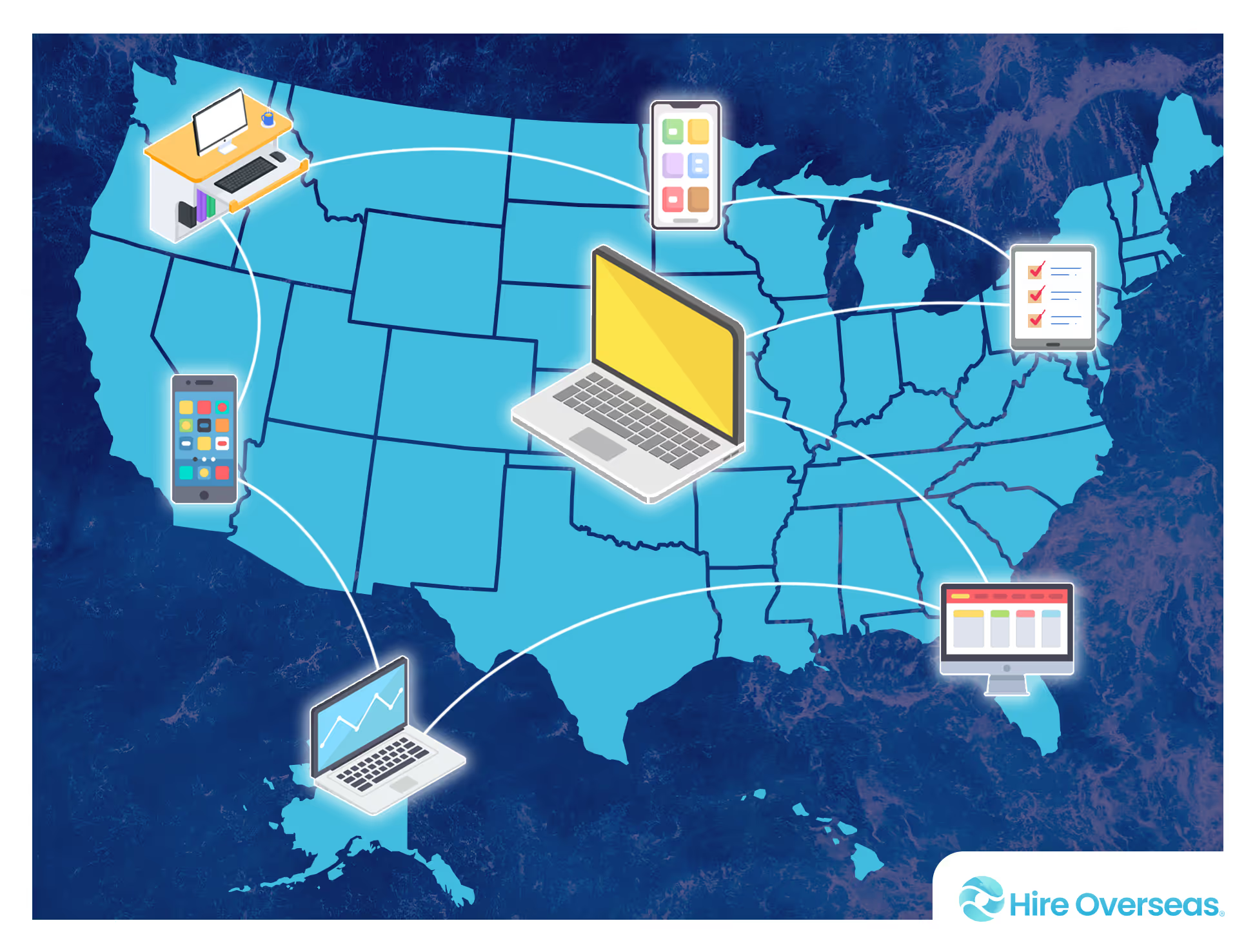Remote Work Laws by State: 2025 Guide for Employers & Employees

Remote work has transformed how companies build teams, making it crucial to understand remote work laws by state. For remote roles, the governing rules are typically based on where the employee performs the work—not the company’s location.
This guide covers which state laws apply to remote employees, how regulations vary, and what employers and workers need to know. From wage and hour rules to expense reimbursement and paid leave, you’ll discover the key factors shaping remote work regulations in 2025. Whether managing a distributed team or navigating your own rights, this resource helps you work and hire confidently across borders.
Why Remote Work Laws Matter More Than Ever
With the expansion of distributed teams, companies are hiring talent across multiple states. This creates unique compliance challenges because employment laws for remote employees are typically governed by the state in which the employee physically works—not where the company is headquartered.
Understanding remote work regulations isn’t just about avoiding penalties; it’s about protecting both employees and businesses.
Which State Law Applies to Remote Employees?
One of the most common questions employers face is: “What state law applies to remote employees?”
When a team is spread across multiple states, it can be confusing to determine whether to follow the laws of the company’s headquarters or the employee’s location. In most cases, the answer is clear: remote employees are subject to the labor laws of the state in which they physically perform their work, not the state where the company is incorporated or where its main office operates.
This rule covers several areas of employment law, including:
- Wage and hour laws (minimum wage, overtime pay, recordkeeping)
- Meal and rest break requirements
- Expense reimbursement rules for home office equipment and internet usage
- Worker classification laws (employee vs. independent contractor)
- Paid leave entitlements, such as sick leave or family leave
These protections are often referred to as work from home laws or remote work laws, ensuring that employees benefit from the standards set in the state where they live and work.
Why does this matter?
For employers, this means you can’t apply a one-size-fits-all policy to all remote staff. You must understand and comply with the unique labor laws for remote employees in each state where your team works. Failure to do so can lead to wage claims, audits, or penalties.
For example:
New York Remote Work Laws:
If a New York-based employee works remotely for a Texas company, they are still entitled to protections under New York remote work laws, including state minimum wage, overtime calculations, and mandatory sick leave. The employer must also handle New York payroll tax withholdings and unemployment insurance.
California Remote Work Laws:
A California employee working from home must receive accurate time tracking, daily overtime pay (for work over 8 hours per day), and mandatory meal and rest breaks. California also requires reimbursement for necessary business expenses, such as internet or phone bills used for work. These rules apply even if the employer is located in another state with more relaxed labor standards.
Exceptions: What If Employees Move or Work in Multiple States?
While the general rule is that the employee’s work location dictates the applicable laws, there are some exceptions and gray areas:
- Temporary Relocation: If an employee temporarily works from another state (e.g., a two-week trip), the home state’s laws usually still apply. However, extended stays may trigger the new state’s employment and tax laws.
- Multiple Work Locations: If an employee splits their time between states, employers may need to comply with both sets of rules or determine the “primary” work location based on the majority of work performed.
- Telecommuting Across State Lines: Some states have reciprocal agreements regarding taxes and labor compliance. Employers should review any such agreements to avoid double taxation or conflicting rules.
Key Remote Work Laws by State

While federal labor standards like the Fair Labor Standards Act (FLSA) apply nationwide, each state imposes its own set of rules regarding wages, working hours, and employer responsibilities. For businesses managing distributed teams, understanding these remote work regulations is essential to avoid legal and financial risks.
Below are examples of how remote work laws by state can differ:
1. California
California has some of the most comprehensive and employee-friendly labor laws in the U.S. When it comes to labor laws for remote employees, the state enforces strict rules that apply even if the employer is based elsewhere. Key requirements include:
- Accurate Timekeeping: Employers must maintain detailed records of hours worked, even for remote employees.
- Daily Overtime: California mandates overtime pay for work over 8 hours per day, not just 40 hours per week.
- Expense Reimbursement: Under California Labor Code Section 2802, employers are required to reimburse remote employees for necessary business expenses, including internet, phone, and sometimes home office equipment.
- Meal and Rest Breaks: California enforces mandatory meal and rest breaks for non-exempt employees, and failure to comply can result in penalties.
Why it matters: Any company hiring remote workers in California must tailor policies to meet these requirements, regardless of the company’s home state.
Source: California Labor Code § 2802; Thai v. IBM (2023) court decision reaffirming reimbursement rules for remote work.
2. New York
New York remote work laws focus heavily on wage and hour protections, proper worker classification, and certain expense reimbursements. Employers with New York-based remote employees must:
- Comply with the state’s minimum wage and overtime regulations.
- Follow the New York Paid Sick Leave Law, which grants paid sick leave to most employees, including those working remotely.
- Accurately classify workers to avoid misclassification penalties under state law.
- Provide reimbursements for business expenses in some cases, depending on contractual obligations or company policy.
Why it matters: Employers must register for New York payroll taxes and unemployment insurance and ensure all HR practices align with state regulations, even if the company has no physical office in New York.
Source: New York Paid Sick Leave; Central NY Law.
3. Texas
Texas has fewer state-specific work from home laws, relying primarily on federal standards. However, employers must still ensure compliance with:
- FLSA Wage and Hour Rules: Including accurate recordkeeping for remote workers.
- Workplace Safety Obligations: Even though employees are at home, employers must still ensure a safe working environment under OSHA guidelines.
- Anti-Discrimination Laws: Texas enforces strict rules around workplace discrimination that apply equally to remote employees.
Why it matters: While Texas is considered business-friendly, employers can’t assume federal law alone covers them; proper documentation and adherence to basic state and federal requirements are still essential.
Source: Chavez Law Firm; Kaufman Dolowich; Texas Workforce Commission; Texas Legislature Bill 5196 on Telework Policies.
4. Florida
Florida’s employment laws for remote employees focus mainly on compliance with minimum wage and proper payroll practices. Employers with remote workers in Florida must:
- Follow state minimum wage laws, which may be higher than the federal minimum.
- Maintain accurate records of hours worked for all non-exempt employees.
- Ensure compliance with federal overtime laws and anti-discrimination protections.
- Provide a safe and harassment-free virtual workplace under state and fe
- deral regulations.
Why it matters: Even without strict work from home laws, Florida employers must carefully track wages and working hours for compliance, especially when managing large remote teams.
Source: Tallahassee Trial Lawyer; SixFifty; Ogletree; Cohen Levy Legal; 4DayWeek.io; Tiffany Cruz Law.
State-by-State Remote Work Laws Comparison
Work From Home Laws: Federal vs. State
There is no single federal “work from home law,” but the Fair Labor Standards Act (FLSA) sets nationwide standards for minimum wage, overtime, and recordkeeping for all employees, including remote workers.
At the state level, things get more complex. Which state laws apply to remote workers depends on the employee’s physical work location. This determines rules for minimum wage, overtime calculations, paid leave, meal breaks, and expense reimbursements.
For employers, this means tracking where employees work and adjusting policies to comply with each state’s remote work laws. Even short-term relocations can create new tax and labor law obligations.
Bottom line: The FLSA provides a baseline, but compliance ultimately depends on adapting to the state-specific laws where each remote employee performs their work.
Employer Obligations for Remote Employees
Managing a distributed workforce comes with unique compliance challenges. When employees live and work in different states, the burden falls on the employer to ensure all relevant remote work laws are followed. Failure to comply can expose the company to legal liability, financial penalties, and reputational risk.
1. Complying with State Labor Laws
Employers must follow the labor laws for remote employees in the state where the employee physically performs work. This includes minimum wage, overtime, mandated breaks, and paid leave requirements. For example, a company based in Texas must still adhere to California’s strict overtime and expense reimbursement rules if their employee works from California.
2. Registering for State Taxes and Unemployment Insurance
In most cases, you are required to register as an employer in the state where your remote employee resides. This allows you to pay the correct state income taxes, withholdings, and unemployment insurance premiums. Many states aggressively enforce these rules, and noncompliance can trigger audits and penalties.
3. Updating Company Policies
Your HR policies, handbooks, and contracts should reflect remote work law requirements for each applicable state. This might include outlining expense reimbursement policies (required in states like California and Illinois), clarifying time-tracking procedures, and ensuring compliance with employment laws for remote employees related to paid sick leave and family leave.
4. Maintaining Accurate Payroll and Time Tracking Systems
Accurate recordkeeping is critical for compliance with the Fair Labor Standards Act (FLSA) and state wage laws. Employers should implement reliable systems to capture hours worked, especially for non-exempt employees, to ensure correct overtime calculations and prevent wage disputes.
Why This Matters
Failing to meet your employer obligations for remote employees can result in:
- Fines and Penalties: For unpaid taxes or wage violations.
- Back Pay Claims: Employees can file claims for unpaid overtime, expenses, or miscalculated wages.
- Lawsuits and Class Actions: Noncompliance with remote work regulations can lead to costly litigation.
Staying ahead of compliance is not just a legal necessity—it also helps build trust and maintain a positive relationship with your distributed team.
Schedule a call with Hire Overseas to start hiring top remote talent and access vetted global professionals to build your team the right way.
Remote Work Laws Compliance Checklist for Employers and Employees

For Employers:
For Employees:
Find your next remote role with top companies worldwide. Join Hire Overseas and work without borders.
Unlock Global Opportunities: Work or Hire Without Borders
Understanding remote work laws by state is critical for businesses managing distributed teams. Whether you’re an employer figuring out what state law applies to remote employees or a worker wondering about your rights, staying informed about remote work regulations will help you avoid legal pitfalls. With Hire Overseas, you can embrace this new era of work. We bridge the gap between companies seeking skilled talent and professionals looking for remote opportunities, providing the structure to hire or work confidently across borders.
Start hiring top remote talent with Hire Overseas—your gateway to global opportunities.
FAQs About Remote Work Laws By State
Do remote work laws differ for full-time employees vs. freelancers?
Yes. Full-time employees are covered under state and federal labor laws, including minimum wage, overtime, and paid leave rules in their work state. Freelancers or independent contractors are generally governed by contract terms, though states like California and Massachusetts have strict worker classification rules that can impact remote arrangements.
How do companies handle remote workers living in different time zones?
Time zone differences don’t affect labor law compliance but impact work hour tracking. Employers must ensure accurate records of hours worked in the employee’s state time zone to meet wage and overtime requirements.
Are employers required to pay for home office upgrades beyond internet and phone bills?
It depends on the state. States like California and Illinois mandate reimbursement for “necessary business expenses,” which can include internet, phone, and sometimes ergonomic chairs or desks if required for work. In other states, this is often dictated by company policy or employment contracts.
What happens if a remote employee relocates without notifying their employer?
If an employee moves to a new state and continues working remotely, the employer is still liable for complying with the new state’s labor laws and tax obligations once the move is discovered. Employers should have policies requiring employees to report relocations immediately to avoid compliance gaps.
Do local city or county laws apply to remote employees?
Yes. In addition to state laws, certain cities (e.g., San Francisco, Seattle, New York City) have their own wage, leave, and expense reimbursement rules that apply if the remote employee lives and works within city limits.
Are hybrid workers subject to remote work laws if they split time between home and the office?
If an employee regularly works from home in a different state than the company office, the home state’s labor laws usually apply for remote work days. Employers may need to comply with both states’ rules depending on the percentage of work performed in each.
Can employers set one universal policy for all remote employees across states?
No. While companies can have general remote work policies, they must customize sections like wage, overtime, leave, and expense reimbursement to meet the specific requirements of each state (and sometimes city) where employees work.
Do remote work laws apply to international employees working for U.S. companies?
No. State labor laws typically apply only to employees physically working within U.S. borders. International workers are governed by their country’s employment laws.Employers hiring abroad must comply with local labor and tax regulations and may work with an Employer of Record (EOR) or partner with Hire Overseas to source and manage vetted global talent while staying aligned with compliance requirements.
Browse Categories
Unlock Global Talent with Ease
Hire Overseas streamlines your hiring process from start to finish, connecting you with top global talent.









